Don’t be weighed down by weight
View(s):
Dr. Thejana Wijeratne
Kalubowila Hospital hosts the first-ever ‘Patient Support Group’ for obese people in the country. Kumudini Hettiarachchi reports
As a slide comes onto the large screen, there is a loud gasp which spreads like a wave through the audience. The double photos on the slide, at first glance, seem to be of a heavily obese mother and a slim and pretty daughter.
The audience, however, knows better – it is one and the same person, afflicted by obesity and relieved of this affliction by surgery. Kanchana has faced and won the battle of the bulge, dropping 40kg from 112kg, as she stands before a crowd to talk of her experiences.
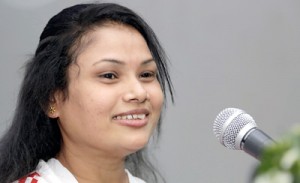
Kanchana tells her success story and inset: Stunning change, Kanchana before and after surgery. Pix by M.A. Pushpa Kumara
Obesity and beating it are the strong bonds that bind the men and women crowding into the seventh-floor auditorium of the Colombo South (Kalubowila) Teaching Hospital on November 7. Although there is a threat of rain as the evening shadows lengthen, even those who have come with tiny babies or slightly older children, remain for the full session, from 3-6 that Saturday.
The session has been organised at the insistence of several patients by Consultant General Surgeon Dr. Thejana Kamil Wijeratne, who is also a Senior Lecturer at the Sri Jayewardenepura Faculty of Medical Sciences. Dr. Wijeratne has helped many of them to wage war on obesity which had sent their metabolism awry.
The meeting is to catalyse the formation of the first-ever ‘Patient Support Group’ for obese people in the country, to encompass not only those who have undergone life-changing bariatric surgery and those who are awaiting this operation but anyone who has worries about his/her increasing weight.
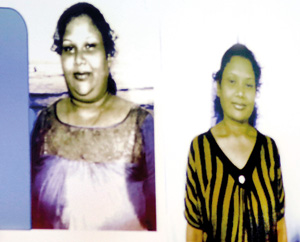
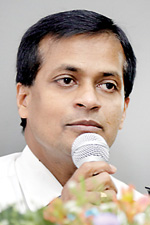
Dr. Uditha Bulugahapitiya
The informal, patient-driven support group will share information and experiences as well as discuss problems, with a Facebook page already being launched by Nazrine. It is being set up as a group “by the patients for the patients”. There is no embarrassment or hesitation as one after the other, patients come to the microphone to talk of the changes wrought in their lives by bariatric surgery.
With the longest list of having performed 62 such surgeries in the country, Dr. Wijeratne says that 56 have been diligently coming in for follow-ups, a vital requirement. The 56 patients include 45 females and 11 males. Dr. Wijeratne’s first and heaviest patient, Namal, speaks with emotion of how bariatric surgery helped her to drop from 164kg to 120kg, while the initiator of the Facebook page, Nazrine, is quick to point out how she was not obese all her life, but as a food-lover like all those in the auditorium, there was a gradual build-up.
Pointing out that usually when people go to the doctor and bariatric surgery is discussed, the tendency on the part of the patient is to focus only on the negatives.Namal says, “You need to be positive. The patient should do what the doctor advises him/her to do and everything will fall into place.”
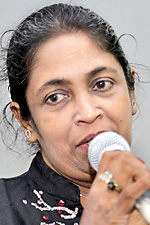
Dr. Wijeratne’s first and heaviest patient, Namal
She speaks through experience, for she has undergone not one but two operations – the first one on August 20, 2010, and the second, a mini-gastric bypass just last year. “The second one was done because I was finding it difficult to breathe, but now I am fine, doing all the housework on my own,” she adds.
Earlier, she was popping more than 12 pills to keep her diabetes under control but now she takes only two pills, she laughs.
“I tried non-surgical means but had only temporary success,” says Nazrine, adding that this failure also placed her on the borderline of diabetes.
Referring to why she feels it is important to have a support group, she stresses that before and after surgery, “you can’t run to the doctors for every little thing”. They are always there, but a support group can help provide information and also moral support.
“We can share our experiences, making both the lives of patients and doctors easier. Surgery is just a tool and we can also encourage people to go for follow-up,” she says.
It is the mother of a 21-year-old who speaks her heart out about sleepless nights because of her daughter’s weight and worries whether she would be able to find a bridegroom. Bariatric surgery has been the answer to her prayers of giving back a figure to her daughter as well as saving her from illnesses such as diabetes.
For Supun, a “star” of Dr. Wijeratne, however, there has been no shortage of invitations to become bestman at numerous weddings since he dropped from 144kg to 87kg. “Life has changed and it is good to reduce one’s weight,” he says simply.
An eminent Panel of Experts was present to whom the audience could voice its concerns, seek clarifications for doubts and though asked not to, say a sincere thank-you for putting their life back on track. Two rows in the auditorium were also occupied by nurses who have silently hovered around the patients, pre and post-surgery, guiding them back to health and holding their hand whenever they were feeling low.
There was much appreciation by Dr. Wijeratne of the support extended by the hospital’s Director, Dr. Asela Gunawardena.
Consultant Endocrinologist Dr. Uditha Bulugahapitiya sends out an urgent request – now that the patients have overcome their obesity, “don’t allow your child or your brother to put on too much weight”.
Tell them how to eat a balanced diet and to be physically active, otherwise the consequences are not only diabetes, hypertension (high blood pressure) and high cholesterol but also wide-ranging issues including sexual problems. The pioneering Consultant Endocrinologist in Sri Lanka, Dr. Henry Rajaratnam, meanwhile, underscored the importance of attending the clinics for follow-up after surgery, going into great detail how when the food intake is restricted there has to be strong monitoring of the intake of vitamins, minerals and calcium to ensure good health.
He had worked in tandem with the pioneer of bariatric surgery in Sri Lanka, Dr. M. Ganesharatnam who was also present at the meeting, as Dr. Wijeratne and Dr. Bulugahapitiya do now for the benefit of patients. There is much laughter when Dr. Rajaratnam equates “fat deposits” to “fixed deposits” and how when there is a need to “withdraw” calories, there is also a need to ensure that there are no deficiencies in vitamins and minerals essential for the body.
When there is a weight-reduction, there is a reduction in sleep apnoea and also knee pain caused by osteoarthritis, he says demonstrating the sleep patterns of obese people which would invariably disturb their spouses. The incidence of cancer is also high in people who are fat, he adds.
The others on the panel included Consultant Surgeon and Senior Lecturer at the Sri Jayewardenepura Faculty of Medical Sciences, Dr Sumudu Kumarage; Consultant Plastic and Reconstruction Surgeon, Dr. Yasas Abeywickrama; and Consultant Nutritionist Dr. Ranil Jayawardene.
| Surgical options Bariatric surgery leads to weight loss by restricting the quantity of food the stomach can hold through gastric restriction or causing malabsorption of nutrients or a combination of both, says Dr. Thejana Wijeratne.It is performed — either through open surgery or more commonly currently laparoscopic (keyhole or minimally-invasive) intervention through small incisions on the abdomen — on people with ‘morbid obesity’ or severe accumulation of excess weight as fatty tissue. 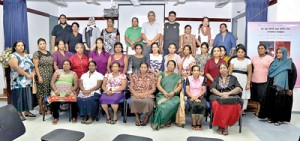 It’s a photo opportunity for all those who have undergone bariatric surgery, after the meeting Morbid obesity goes hand-in-hand with serious health issues including cardiovascular, respiratory, metabolic, gastrointestinal and psychological which can impact on all organs, MediScene learns. The pre-requisites for bariatric surgery include a patient’s life expectancy (being young or middle-aged) and whether the patient has obesity-related co-morbidities including diabetes, fatty liver disease, poorly-controlled or uncontrolled hypertension, high cholesterol, obstructive sleep apnoea and weight-related joint issues. It is only as a ‘side-effect’ that there is a major change in the cosmetic appearance of the patient and bariatric surgery is usually the last resort, in the wake of a stringent diet regimen, a strict exercise schedule along with psychotherapy which have proved futile. Bariatric surgery would depend on the Body Mass Index (BMI) which is the body weight (in kilograms) divided by the square of the height (in metres). Normal – a BMI in the range Restrictive bariatric surgery under which comes Laparoscopic Adjustable Gastric Band (LAGB) and Laparoscopic Sleeve Gastrectomy (LSG) Bariatric surgery helps reduce the quantity of food eaten or the quantum of nutrients especially fats, absorbed by the body by making the stomach smaller or allowing the food to bypass part of the small intestine or bowel where most of the nutrients and calories are absorbed to the body. | |


